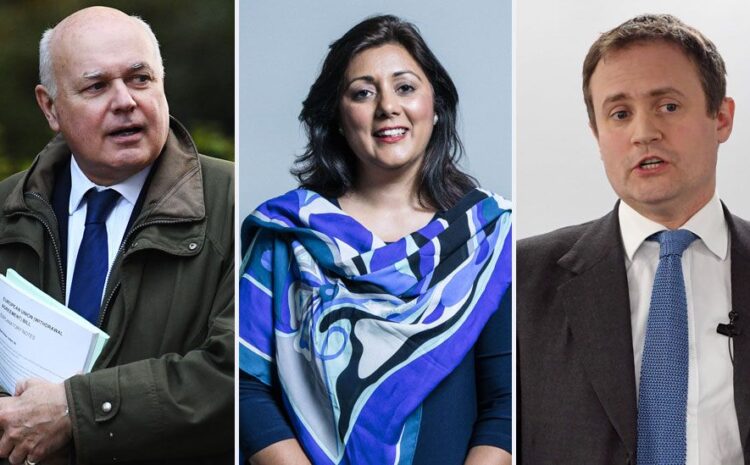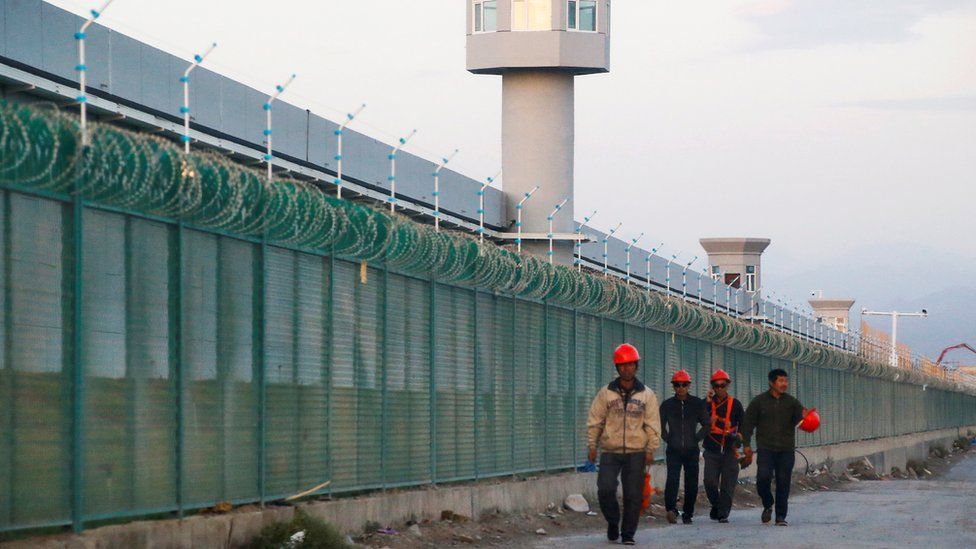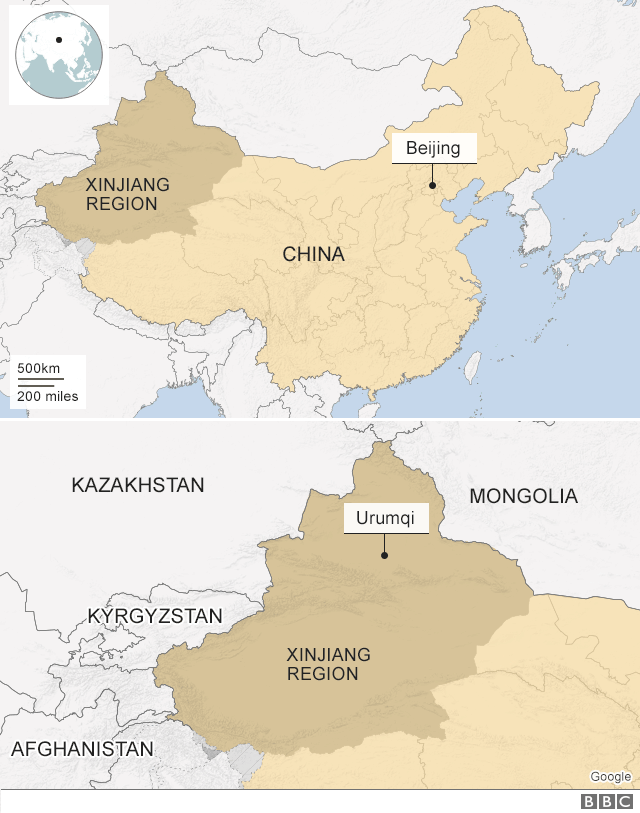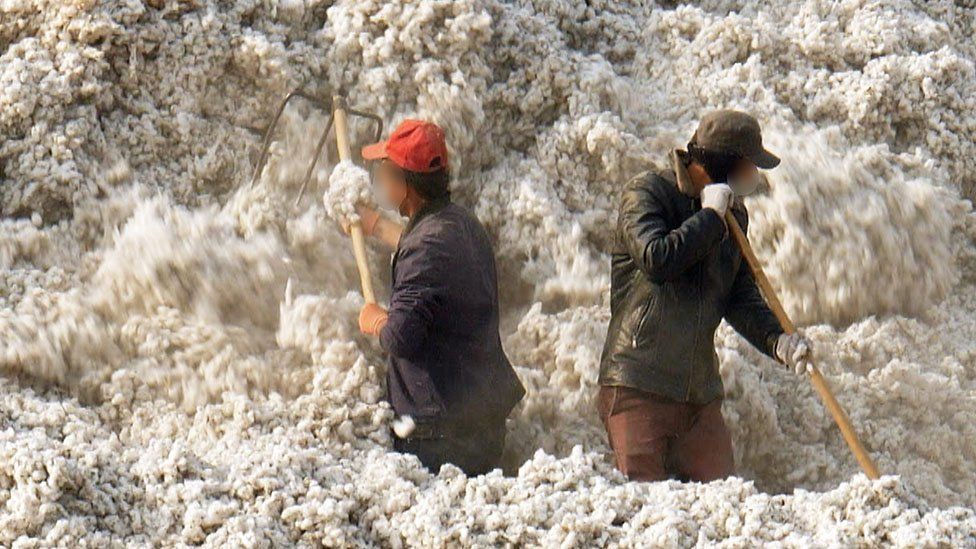
IMAGE COPYRIGHT GETTY IMAGES/UK PARLIAMENT/PA MEDIA image caption Iain Duncan Smith, Nusrat Ghani and Tom Tugendhat have been banned from entering China
China has imposed sanctions on nine UK citizens – including five MPs – for spreading what it called “lies and disinformation” about the country.
The group are among the most vocal critics of China in the UK.
It comes in retaliation for measures taken by the UK government on Monday over human rights abuses against the Uighur Muslim minority group.
Boris Johnson said those sanctioned were “shining a light” on “gross human rights violations”.
“Freedom to speak out in opposition to abuse is fundamental and I stand firmly with them,” the prime minister said in a tweet.
The foreign secretary said if Beijing wanted to “credibly rebut” the claims it should allow UN access to Xinjiang.
Sir Iain said he would wear the sanctions “as a badge of honour”.
The response by China follows similar sanctions imposed on the European Union, which was part of the co-ordinated action on Monday, along with the UK, the US and Canada.
China has detained Uighurs at camps in the north-west region of Xinjiang, where allegations of torture, forced labour and sexual abuse have emerged.
It has denied the allegations of abuse, claiming the camps are “re-education” facilities used to combat terrorism.
- Tory MPs Sir Iain, Nusrat Ghani and Tim Loughton, and peers Baroness Kennedy and Lord Alton, who are all members of the Inter-Parliamentary Alliance on China
- Tory MPs Tom Tugendhat and Neil O’Brien, who lead the China Research Group
- Lawyer Sir Geoffrey Nice QC, chair of the Uighur Tribunal, which is investigating atrocities against the minority group
- Newcastle University academic Jo Smith Finley, whose research focuses on the Uighurs
They will all be banned from entering China, Hong Kong and Macau, their property in China will be frozen and Chinese citizens and institutions will be prohibited from doing business with them.
Sir Iain said: “Those of us who live free lives under the rule of law must speak for those who have no voice. If that brings the anger of China down upon me then I shall wear that as a badge of honour.”
Mr Tugendhat, who chairs the Commons Foreign Affairs Committee, told the BBC: “I view this as a direct assault on British democracy and an attempt to silence the British people who have chosen me to speak for them – if that isn’t an assault on British sovereignty, I don’t know what is.”
Ms Ghani told BBC Radio 4’s Today programme the move was a “wake-up call” for democratic countries, that China would sanction law-makers who were just doing their job.
She added: “I won’t be intimidated. This has now made me even more determined to speak out about the Uighurs.”
Academic Dr Smith Finley tweeted: “I have no regrets for speaking out, and I will not be silenced.”
 IMAGE COPYRIGHT REUTERS
IMAGE COPYRIGHT REUTERSForeign Secretary Dominic Raab said the government “stands in total solidarity” with those sanctioned by China.
“It’s not going to stop them, it’s not going to stop the British government speaking up about the industrial scale human rights abuses taking place in Xinjiang,” he told the BBC.
He added that China should allow access to Xinjiang for the United Nation’s commissioner for human rights if it wanted to continue with “blanket denials”.
Labour’s shadow foreign secretary Lisa Nandy said the sanctions were a “direct attempt to silence those who criticise the actions of the Chinese government”.
She welcomed Mr Raab’s condemnation of the sanctions but criticised the government’s “mixed messages” on trade deals with China.
A Chinese foreign ministry spokesman said the UK’s decision to impose sanctions “flagrantly breaches international law and basic norms governing international relations, grossly interferes in China’s internal affairs, and severely undermines China-UK relations”.
He added that the Chinese foreign ministry had summoned the British Ambassador to China to “lodge solemn representations, expressing firm opposition and strong condemnation”.
A Chinese foreign ministry spokeswoman, Hua Chunying, later told a press briefing China was forced to act “in self-defence” in response to UK sanctions “based on lies”.
A spokesman from the Chinese embassy in London criticised the UK’s use of sanctions adding that China “never provokes confrontation” but if others do “we are ready to keep them company”.

Relations ‘will deteriorate further’

This retaliation by the Chinese government was not unexpected.
From the moment the UK imposed its first ever sanctions on Chinese officials earlier in the week, a response from Beijing was inevitable.
But that does not mean the tit-for-tat exchange of sanctions is unimportant. It will ensure that the UK’s already poor relationship with China will deteriorate further.
And that matters because the government is trying to strike a balance in its relations with Beijing.
In its recent foreign policy review, the UK described China as a “systemic competitor” and “the biggest state-based threat to the UK’s economic security”.
But it also spoke of pursuing “a positive trade and investment relationship” and co-operating with China on climate change and biodiversity. All that just became a little harder still.

Four groups have also been sanctioned – the China Research Group, the Conservative Party Human Rights Commission, the Uighur Tribunal, and Essex Court Chambers.
A legal opinion by senior barristers at Essex Court Chambers had concluded there was a “very credible case” that the Chinese government was committing genocide against the Uighurs.
An Inter-Parliamentary Alliance on China spokesman said: “The decision to sanction five of our British members is a flagrant assault on those parliamentarians’ rights to conduct their duties.
“We will be making urgent representations to ministers and the House authorities to see that they’re protected from danger or harm as a result of the communist party’s bullying.”

China ‘targeting’ Boris Johnson

China has gone for the people exerting the most pressure on Boris Johnson to be tough on China.
It’s gone for the people who say “genocide” has happened in Xinjiang.
The measures are essentially tokenistic – it’s unlikely these people or entities did any business with Chinese firms or people anyway.
Targeting Neil O’Brien is personal for the UK prime minister. The MP is in charge of leading policy in Downing Street.
Going after Essex Court Chambers – a group of self-employed barristers – for a legal opinion it reached also shows you how China views an independent judicial system. It doesn’t believe in them.

After UK sanctions were announced on Monday, UK Foreign Secretary Dominic Raab called the abuse of Uighur Muslims in Xinjiang “one of the worst human rights crises of our time”.
More than a million Uighurs and other minorities are estimated to have been detained in camps in Xinjiang.

Xinjiang lies in the north-west of China and is the country’s biggest region. Like Tibet, it is autonomous, meaning – in theory – it has some powers of self-governance. But in practice, both face major restrictions by the central government.
Uighurs living in the region speak their own language, similar to Turkish, and see themselves as culturally and ethnically close to Central Asian nations.
The Chinese government has been accused of carrying out forced sterilisations on Uighur women and separating children from their families.
The country initially denied the existence of the camps, before defending them as a necessary measure against terrorism. It has denied allegations of human rights abuses.
You may also be interested in:

China is forcing hundreds of thousands of Uighurs and other minorities into hard, manual labour in the vast cotton fields of Xinjiang, according to research seen by the BBC. It’s the first clear picture of the potential scale of forced labour in the picking of a crop that accounts for a fifth of the world’s cotton supply and is used widely throughout the global fashion industry.
